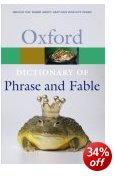explanations, origins, and definitions
This Dictionary of Phrase and Fable is a paperback cut-down version of the complete Oxford Dictionary of Phrase & Fable. It contains over 10,000 phrases, sayings, and allusions – including single words and names that crop up in cultural references – and offers a brief explanation of their meanings and origins. It also includes terms from the classical world of Greece and Rome, as well as other mythologies and religious beliefs – including folk customs, superstitions, and other forms of popular beliefs, as well as factual history and common record.
 So, there are potted biographies of St Lawrence, the Christian martyr, as well as Lazarus, the man who rather miraculously rose from the dead. Ulysses sits fairly closely alongside the Unnabomber – which suggests to me that this book would be a fairly useful resource for crossword puzzlers and participants in my local pub quiz. Entries run from Aaron and abacus to Zoroastrianism, Zorro, and Zwinglian – respectively a monotheistic pre-Islamic religion, a Californian-Spanish Robin Hood, and a supporter of the sixteenth century Swiss protestant reformer.
So, there are potted biographies of St Lawrence, the Christian martyr, as well as Lazarus, the man who rather miraculously rose from the dead. Ulysses sits fairly closely alongside the Unnabomber – which suggests to me that this book would be a fairly useful resource for crossword puzzlers and participants in my local pub quiz. Entries run from Aaron and abacus to Zoroastrianism, Zorro, and Zwinglian – respectively a monotheistic pre-Islamic religion, a Californian-Spanish Robin Hood, and a supporter of the sixteenth century Swiss protestant reformer.
There are also up-to-date entries on historic events such as 9/11 and tsunami, and I was glad to see that dodgy dossier was included – so that it will hang as long as possible like an albatross around Tony Blair’s neck where it belongs.
Commonly used words which occur in a number of expressions are given their own sub-categories – as follows:
milk
milk for babies something easy and pleasant to learn; especially in allusion to 1 Corinthians 3:2 and Hebrews 5:12, contrasted with ‘strong meat’ (see > STRONG).
the milk in the coconut a puzzling fact or circumstance, the crux of something (informal, first recorded in the US in the mid 19th century).
milk of human kindness compassion, sympathy; originally from Shakespeare’s Macbeth (1606), in Lady Macbeth’s expression of her anxiety that her husband lacked the necessary ruthlessness to kill King Duncan and seize the throne.
mother’s milk in figurative usage, something providing sustenance or regarded by a person as entirely appropriate to them.
See also > why buy a COW when milk is so cheap? it is no use crying over spilt milk at > CRY, land of milk and honey at
> LAND2
It includes fictional characters such as Anna Karenina, historic events such as the name of the B-29 bomber that dropped the atomic bomb on Hiroshima (Enola Gay), obscure terms such as oxymoron and palimpsest, and important figures such as Hindenburg and Rasputin, as well as the possible origins of expressions such as backing into the limelight, and even the fashionable jumping the shark.
This is a serious modern contender challenging the longstanding supremacy of Brewer’s Dictionary of Phrase and Fable – a book of which it is said nobody would find of any use, but which has been in print for over 150 years, because it is so eccentric and funny.
© Roy Johnson 2006
Oxford Dictionary of Phrase and Fable, Oxford: Oxford University Press (2nd edn) 2006, pp.805, ISBN: 019920246X
More on dictionaries
More on language
More on grammar